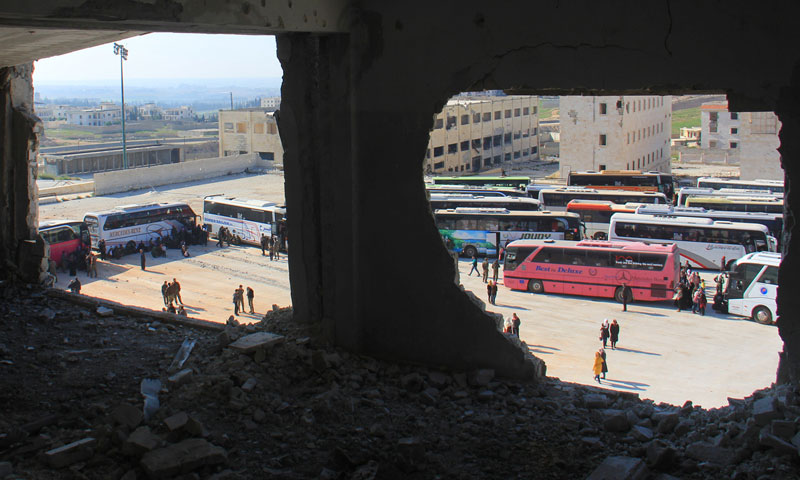



“I was trying to be the last to exit, as to grasp as much as I could of my childhood memories, which started to bore on my imagination, when I knew of the arrival of the green buses that will drive us to Idlib without a return,” says Lina Darwish, in her thirties, adding that “these buses were like an omen that will never relinquish my memory.”
Lina, a math teacher at a preparatory school, tells Enab Baladi about the last moments she spent in Harasta, one of the eastern Ghouta’s towns, rural Damascus, before she started her journey of displacement.
The green buses, which own nothing of the symbols of their color but the color itself, fill the spaces and kick off towards the unknown, driving one portion of people only to return to take another.
In the Turkish city of Istanbul, where about 600 thousand Syrians are based, the situation differs, as the internal public transport buses, which turned into a symbol of displacement in Syria, changed into a thing that celebrates Syrians, expressing joy over their personal events, similar to what happened with the young woman Muzna, a student at Istanbul University.
Muzna recounts to Enab Baladi what happened, saying: “Amidst the universal disregard of our humanity as Syrians, I received a nice gesture at one of the public transport vehicles in Istanbul, on the way to a training course in the morning of September 18,” adding “when I passed my bus card on the payment machine, it said: “doğum günün kutlu olsun,” (happy birthday).”
Despite the happiness that overcome Muzna, the incident brought back to her memory the scenes of displacement on board of the Syrian internal public transport buses, as she put it.
That day, Muzna was not expecting to have such a birthday celebration, for what happened with her without a prior notice was a dream for Israa, a 16 years old girl, from one of eastern Ghouta’s towns, who used to dream of taking the internal public transport buses to university in the future, to end up boarding one of them in a journey of displacement.
“I used to dream of the buses as a source of happiness, upon taking it to university, not as the tool of my displacement to an exile that would deprive me of pursuing my life as I want it and send me far away from the place where my roots are,” Issra says.
The green buses, once a part of the cultural scene in Syria, turned into a strategic trait, “surrender or starve to death otherwise,” of the forced displacement journey, which the Syrian regime and its Russian and Iranian allies have imposed on those who opposed it, under the so called “national reconciliation.”
The green buses, Chinese made, entered the Syrian cities for the first time in 2009, amidst a huge popular celebration. Back then, the buses stood for the modernization promised by Bashar al-Assad, taking the place of the regular school buses and, with their presence, supported the white smaller buses, known as “service,” as to offer a developed public transport vehicle, to which students and employees have access.
For Syrian people, the presence of a transport means to take them to their jobs was an important feature; however, in Istanbul, this wish turned into a reality larger than expected.
“Despite being expatriates, these features did not differentiate between us and any other Turkish citizen; they made us feel that we are valuable people in a community that respects its residents,” Muzna says.
In 2015, the Directorate of Transport in Istanbul developed this feature, after it started sending SMS messages congratulating citizens on their personal occasions in 2011, to directly celebrate them during using the payment card and boarding the bus for holders of the “Blue Card” and “Student Card,” for the personal data of the users of these cards are uploaded to the system during their extraction from the offices of the Directorate of Transport, helping them benefit from the transportation discounts.
In Eastern Ghouta, contrastingly, the young woman Bayan had a share of a different feature of the internal public transport, of which she informed Enab Baladi, saying: “Every convey that passed before me, made my heart bleed in pain, one that my words fail to express.”
Bayan, an English language teacher, and one of the women displaced from Harasta, narrates to Enab Baladi what her imagination still holds about the green buses and the displacement journey; “I saw oppression in the eyes of the men, and fear controlled me of an unknown future awaiting me.”
According to UN’s estimates, between March 9 and April 18, 2018, more than 55 thousand people exited Eastern Ghouta to Idlib governorate, under the organized displacement agreements, signed with Russia.
The green buses’ journey towards Idlib, did not only board people from Eastern Ghouta, but it also carried people from other Syrian cities and towns since the beginning of 2014; thus, transporting all those who opposed the regime to Idlib governorate, amidst a universal silence and UN’s concerns and condemnation.
This article has been written under the “Practice” Training Program, launched by Enab Baladi Foundation.
if you think the article contain wrong information or you have additional details Send Correction